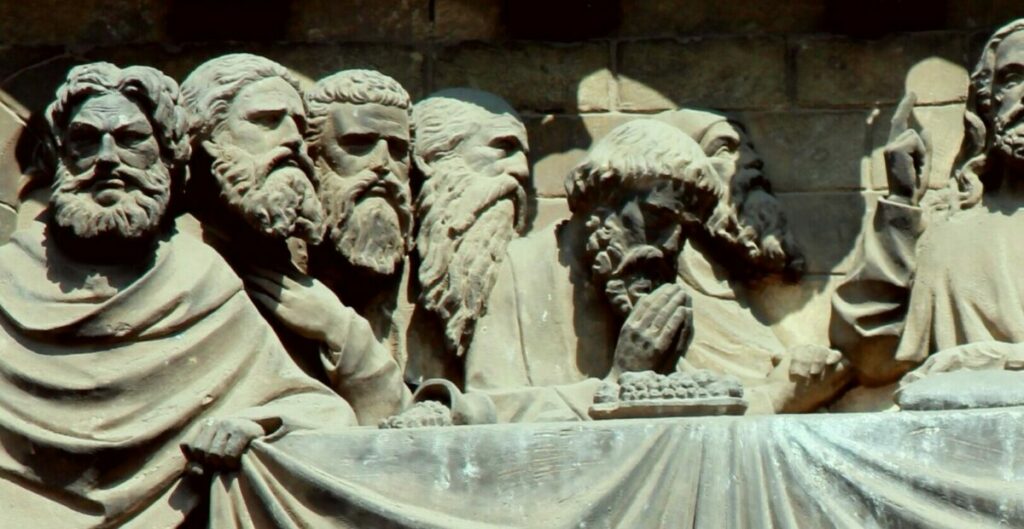by David H. Petersen
A friend of mine recently pointed out that just as most children find it easier to get along with their grandparents than with their siblings, we in the Church Militant find it easier to honor our fathers in the faith than the brothers who surround us.
That is not how it should be. We should submit to one another in love (Eph. 5:21) and seek to fulfill the commandment of Christ that we love one another (John 13:34). Yet so often, instead, both biological brothers and spiritual brothers fight. We find it is easy to respect those who came before us, perhaps because they are at a distance, but with those around us we squabble and fight.
In Galatians 5, St. Paul admonishes us to not gratify the desires of the flesh. He then lists fifteen specific works of the flesh and a catch-all: “sexual immorality, impurity, sensuality, idolatry, sorcery, enmity, strife, jealousy, fits of anger, rivalries, dissensions, divisions, envy, drunkenness, orgies, and things like these” (Gal. 5:19–21).
I think the heart of this list, alongside the societal and personal ills and things that destroy Holy Marriage at the front and back of the list, are the works of the flesh that directly attack our ability and desire to love one another and live in a harmonious community. Though more could likely be added, here are the peculiar works that Paul lists which work against love in the church: enmity, strife, jealousy, fits of anger, rivalries, dissensions, divisions and envy.
Children, in general, get along more easily with their grandparents than with their siblings because they are not jealous of their grandparents. Nor do they compete with or against their grandparents. Instead they simply receive their grandparents’ love.
The love between siblings, on the other hand, is more reciprocal and equal. It involves sharing. That relationship is riper for conflict than the relationship with grandparents. Paul knew this was a problem and therefore introduced this section of Galatians 5 with the words “the whole law is fulfilled in one word: ‘You shall love your neighbor as yourself.’ But if you bite and devour one another, watch out that you are not consumed by one another” (Gal. 5:14–15). He ends this chapter and section in a similar way, with a call directly aimed at these problems, saying: “Let us not become conceited, provoking one another, envying one another” (Gal. 5:26).
In my own experience as a pastor, I have felt very little jealousy for the honor given my teachers. They speak and I listen. I am happy when they are praised. It could be that the Old Man in me tolerates this because I am vainly imagining that any honor given to them reflects back on me since I am their student, but I don’t think that is the driving force. I think the reason I am not jealous is largely because I don’t feel that my teachers are my peers, or are a threat to my share of things. I am not striving to obtain their glory for myself or thinking that their glory could be mine.
I find it much more difficult to be happy when a colleague receives praise or honor for work that is similar to my own. I almost always have at least a flash of jealousy and fear of pride in those cases that is completely wrapped up in seeking my own glory.
For me, then, this is what I must squash, daily, by contrition and repentance, by fasting and prayer; by staying in and with what God gives so generously through His Son in the Church, that is, the redeeming grace of the Holy Gospel. I find that naming the sin for what it is, enmity, strife, jealousy, fits of anger, rivalries, dissensions, divisions, and envy, is an aid in squashing it, and an aid to my own confession of sins.
Reflection on jealousy in the brotherhood has led me to a new appreciation of Our Lord’s humility and his refusal to be petty and self-serving in this way. I am particularly moved in this light by the King James rendering of Philippians 2. St. Paul, here, shows that in the mind of Christ a demand for equality with the Father would be robbery of the Father’s glory.
“Who, being in the form of God, thought it not robbery to be equal with God: But made himself of no reputation, and took upon him the form of a servant, and was made in the likeness of men: And being found in fashion as a man, he humbled himself, and became obedient unto death, even the death of the cross.” (Phil. 2:6–8 KJV)
The following sentence introduces that paragraph: “Let this mind be in you, which was also in Christ Jesus” (Phil. 2:5 KJV). May God in His mercy make it so among us and thereby give us peace in the Church where brothers are engaging.
The Rev. David H. Petersen is the pastor of Redeemer Lutheran Church in Fort Wayne, Ind.







I think what Paul is suggesting and you have reaffirmed, is that we should look at others with the eyes of Christ, in love and fellowship, and always want the best for people. The “best” is salvation in Christ, and a life of faith. We must empty ourselves of jealousy and the idea of competition and self centeredness. Those outside of the faith and who deny Christ in word or deed are already dead in sin and unbelief, and are not brothers or sisters in the Lord, but since we cannot tell the future, we cannot assume they will not be saved at some point in their lives. We must then, still pray for them. My favorite verse among many is John 3.30. “He must increase but I must decrease.” If we follow this verse, we will always put Christ first, and strive to rid our minds of jealousy and other vices of the flesh. Soli Deo Gloria.